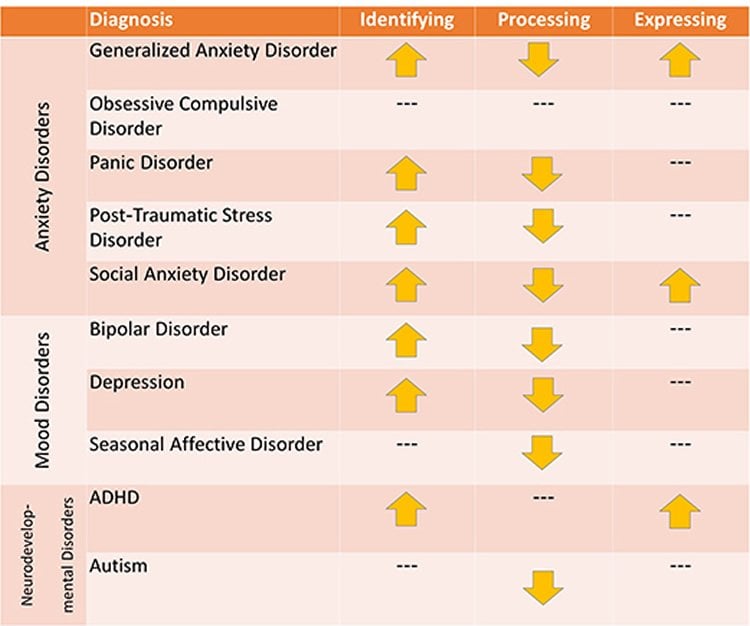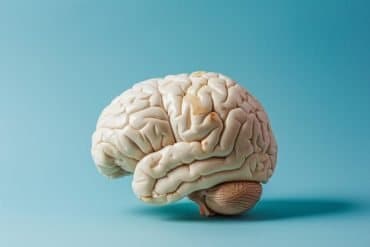Summary: Researchers have developed a new assessment model that breaks emotional regulation into three different elements. The MAS assessment will provide clinicians a new way in which to diagnose mood and mental health disorders.
Source: City College of New York.
For decades psychologists have studied how people regulate emotions using a multitude of ways to conceptualize and assess emotion regulation. Now a recent study published this week in the journal PLOS ONE by Elliot Jurist and David M. Greenberg of The City College of New York, shows how a new assessment model can give clinicians an exciting new way to think about clinical diagnoses including anxiety, mood, and developmental disorders.
The authors developed the Mentalized Affectivity Scale (MAS) – a novel assessment model which breaks emotion regulation into three elements:
- Identifying: the ability to identify emotions and to reflect on the factors that influence them (e.g. childhood events)
- Processing: the ability to modulate and distinguish complex emotions
- Expressing: the tendency to express emotions outwardly or inwardly
Jurist and Greenberg administered the MAS to nearly 3,000 adults online. Statistical modeling of the results showed: processing emotions delineates from identifying them and expressing emotions delineates from processing them.
The team of psychologists also found that emotion regulation was linked to personality and wellbeing in surprising and unexpected ways and that the ability to process and modulate emotions was a positive predictor of wellbeing beyond personality and demographic information. As the accompanying chart shows, one of the most important findings was how the three elements linked to the participants’ prior clinical diagnoses across anxiety, mood, eating, and neurodevelopmental disorders.
“We have introduced a way for psychologists and psychiatrists to use emotion regulation to supplement diagnoses,” said Greenberg, the lead author who is a postdoc student at Colin Powell School for Civic and Global Leadership.

Jurist, the senior author and director of the Mentalized Affectivity Lab at CCNY and Professor at the Colin Powell School for Civic and Global Leadership said: “For the first time we have empirical evidence for the validity and usefulness of the theory that can be carried out into the mainstream by neuroscientists, emotion researchers and psychiatrists.”
Source: Rebecca Rivera – City College of New York
Publisher: Content organized by NeuroscienceNews.com.
Image Source: NeuroscienceNews.com image is adapted from the City College of New York news release.
Original Research: Full open access research for “Mentalized affectivity: A new model and assessment of emotion regulation” by David M. Greenberg, Jonela Kolasi, Camilla P. Hegsted, Yoni Berkowitz, and Elliot L. Jurist in PLOS ONE. Published online October 18 2017 doi:10.1371/journal.pone.0185264
[cbtabs][cbtab title=”MLA”]City College of New York “New Model Links Emotions and Mental Health.” NeuroscienceNews. NeuroscienceNews, 20 October 2017.
<https://neurosciencenews.com/mental-health-emotions-7778/>.[/cbtab][cbtab title=”APA”]City College of New York (2017, October 20). New Model Links Emotions and Mental Health. NeuroscienceNews. Retrieved October 20, 2017 from https://neurosciencenews.com/mental-health-emotions-7778/[/cbtab][cbtab title=”Chicago”]City College of New York “New Model Links Emotions and Mental Health.” https://neurosciencenews.com/mental-health-emotions-7778/ (accessed October 20, 2017).[/cbtab][/cbtabs]
Abstract
Mentalized affectivity: A new model and assessment of emotion regulation
Here we introduce a new assessment of emotion regulation called the Mentalized Affectivity Scale (MAS). A large online adult sample (N = 2,840) completed the 60-item MAS along with a battery of psychological measures. Results revealed a robust three-component structure underlying mentalized affectivity, which we labeled: Identifying emotions (the ability to identify emotions and to reflect on the factors that influence them); Processing emotions (the ability to modulate and distinguish complex emotions); and Expressing emotions (the tendency to express emotions outwardly or inwardly). Hierarchical modeling suggested that Processing emotions delineates from Identifying them, and Expressing emotions delineates from Processing them. We then showed how these components are associated with personality traits, well-being, trauma, and 18 different psychological disorders (including mood, neurological, and personality disorders). Notably, those with anxiety, mood, and personality disorders showed a profile of high Identifying and low Processing compared to controls. Further, results showed how mentalized affectivity scores varied across psychological treatment modalities and years spent in therapy. Taken together, the model of mentalized affectivity advances prior theory and research on emotion regulation and the MAS is a useful and reliable instrument that can be used in both clinical and non-clinical settings in psychology, psychiatry, and neuroscience.
“Mentalized affectivity: A new model and assessment of emotion regulation” by David M. Greenberg, Jonela Kolasi, Camilla P. Hegsted, Yoni Berkowitz, and Elliot L. Jurist in PLOS ONE. Published online October 18 2017 doi:10.1371/journal.pone.0185264






